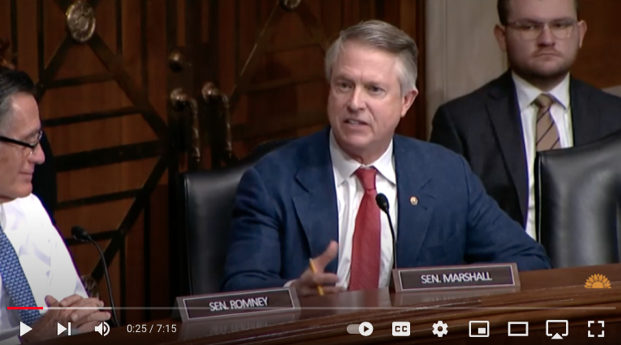Marshall Shines Light on the Real ‘Boogeymen’ in Prescription Drug Pricing
Washington, D.C. – U.S. Senator Roger Marshall, M.D. joined a Health, Education, Labor, and Pensions (HELP) Committeepartisan hearing questioning witnesses from top pharmaceutical companies on why the U.S. has the highest prescription drug prices in the world. Panelists included Chris Boerner, Chief Executive Officer (CEO) of Bristol Myers Squibb; Joaquin Duato, CEO of Johnson & Johnson; and Robert Davis, CEO of Merck & Co.
Democrats focused on single-payer health care and partisan policies. Senator Marshall demonstrated why single-payer health systems block access to care. He also discussed the benefits of innovation in driving down expensive hospital costs and improving patient outcomes drawing from his experience as a practicing physician. Finally, he pointed to pharmacy benefit managers (PBMs) distorting drug pricing, taking the largest share of prescription drug spending.
Earlier this week, Senator Marshall went on Fox Businessstating that while he agrees with the HELP Committee Chair, Bernie Sanders (I-VT), that drug prices in America are too high, Sanders was going after the wrong entity. The real culprit, he said, are PBMs.

You may click HERE or on the image above to watch Senator Marshall’s full questioning.
Highlights from Senator Marshall’s questioning included:
Senator Marshall: As we talk about rationing care, we’ve discussed how we’re rationing care in foreign countries. But I want you to speak about rationing care in this country. How do PBMs ration care when they take a drug like Eliquis and don’t allow it on their formulary? Does that ever happen?
Chris Boerner: Senator, I’m glad you raised that point. We have had absolutely that case happen on multiple drugs, we’ve had it happen on Eliquis, we’ve had it happen where when we have not been able to reach an agreement with an intermediary on a rebate that they’ve taken Eliquis off of formulary. And when that happens, those patients no longer have access to Eliquis. And they have to go on to another brand or in many cases, they may go on to warfarin, as you say Eliquis is the number one product in the oral anticoagulant space.
Senator Marshall: Next, I want to talk about delinking. And you have at the time a pretty miracle drug of your own to treat diabetes with and there’s a list price, what percentage of that list price is typically Merck get at the end of the day?
Robert Davis: Senator, if you look at Januvia, which is the drug that you’re speaking to, the list price is $6,900 per year per year. For Merck, we recognize $690 on that drug per year.
Senator Marshall: So the list price, you’re only getting 10%.
Robert Davis: It’s a 90% discount.
Senator Marshall: Where does the rest of that money go?
Robert Davis: Into the middlemen, into the system as a whole.
Senator Marshall: You all have an antiviral drug that’s been approved. How many drugs did you go down as when Covid hit to develop multiple drugs? How many have made it across the finish line and what did you spend on R&D as you look at those all together?
Robert Davis: So when the COVID situation hit, we drove two or four key programs. Two in vaccines, two in antivirals, only one of those succeeded, which is the drug Legevrio. The total spend across those four programs is a little over two and a half billion dollars.
Senator Marshall: So you spent two and a half billion dollars, you got one across the finish line, an antiviral, is that being used in the United States?
Robert Davis: Very little, it has emergency use authorization and never got to full approval. And so we’re actually seeing it being used much more outside the United States.
Senator Marshall: So in actuality, you spent two and a half billion dollars and got none of significant market share in the United States despite that.
Senator Marshall: What type of efforts does Johnson & Johnson make to work with 340B programs and to help some of these people who need help?
Joaquin Duato: We care deeply about patient affordability, but also we care about the sustainability of the rural hospitals and small hospitals that take care of patients who are underserved. So we believe that the 340B program, it’s an important program to support those hospitals. And we are fully, fully looking forward to collaborating with them in any way we can to support past patient access in those hospitals.
Senator Marshall: The people of Kansas sent me here to save Medicare. And to save Medicare, I need a miracle drug to treat Alzheimer’s. It seems to me that Americans bear the burden of most of the R&D in this world and other countries benefit from it. And that impacts the price, in many ways as well. Mr. Davis, am I wrong? Why does it feel like Americans are appealing most of the brunt to the R&D cost or is that not accurate?
Robert Davis: Well, I think Senator, it gets down to, as you look across the globe, different markets. I appreciate what the U.S. does. I think the U.S. favors innovation, it values access for our patients, fast access, most access, many markets around the world don’t do that. What they focus on more is their budget and how they meet those budget needs. And we appreciate the budgetary constraints that everyone faces. But as a result of that, often patients aren’t getting access to meds. They don’t get them as fast as we’ve commented on today. And it’s harder to see how you can support the innovation we need to do in a situation.
